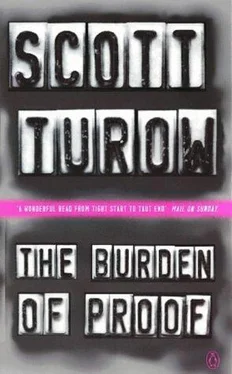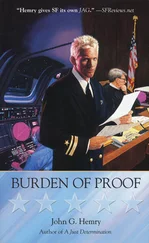Scott Turow - The Burden of Proof
Здесь есть возможность читать онлайн «Scott Turow - The Burden of Proof» весь текст электронной книги совершенно бесплатно (целиком полную версию без сокращений). В некоторых случаях можно слушать аудио, скачать через торрент в формате fb2 и присутствует краткое содержание. Жанр: Детектив, на английском языке. Описание произведения, (предисловие) а так же отзывы посетителей доступны на портале библиотеки ЛибКат.
- Название:The Burden of Proof
- Автор:
- Жанр:
- Год:неизвестен
- ISBN:нет данных
- Рейтинг книги:3 / 5. Голосов: 1
-
Избранное:Добавить в избранное
- Отзывы:
-
Ваша оценка:
- 60
- 1
- 2
- 3
- 4
- 5
The Burden of Proof: краткое содержание, описание и аннотация
Предлагаем к чтению аннотацию, описание, краткое содержание или предисловие (зависит от того, что написал сам автор книги «The Burden of Proof»). Если вы не нашли необходимую информацию о книге — напишите в комментариях, мы постараемся отыскать её.
The Burden of Proof — читать онлайн бесплатно полную книгу (весь текст) целиком
Ниже представлен текст книги, разбитый по страницам. Система сохранения места последней прочитанной страницы, позволяет с удобством читать онлайн бесплатно книгу «The Burden of Proof», без необходимости каждый раз заново искать на чём Вы остановились. Поставьте закладку, и сможете в любой момент перейти на страницу, на которой закончили чтение.
Интервал:
Закладка:
"Chicago account?"
"Kindle," she said. "05." She lifted her bottom from one of the cream-colored chairs to point to the account number. "Greco found them."
"Peculiar," said Stern.
"Oh, that ain't what's strange."
"No?"
"Look through 'em."
He did, and as usual noticed nothing.
"Look at the activity. Look at the balance. Remember? This is where he's puttin all that money he makes tradin ahead.
I thought for sure he'd be cashin out these positions he's transferrin in, havin us cut him one check after another.
You know: take the money and run."
Clearly, however, that was not what had occurred. The statements portrayed frequent trading, two or three movements a day. There was no unusual concentration of positions. T-bonds. Silver. Beans. Sugar.
Yen. Those were the favorites, but all were frequently traded, often with multiple moves each day. Stern read to the end in Febmary of that year.
"He lost money?" asked Stern.
"Not just money," said Margy. "Everything. There ain't a red centavo that got stole that didn't end up goin right back into the market. Hell, he didn't just lose all that.
He lost more. Look at the last statement."
Stern turned the pages again. On the final statement, in boldface, there was a deficit balance reflected of slightly more than $250,000.
Trading on marg'm-borrowing money from the house to put on positions worth more than what you had invested in the account-it was always possible to lose large amounts quickly, and it had happened here to a farethee-well. Everything had been sunk into sugar contracts, which had come to ruin over several days in February when the market ran wild. By the time Mr. Wunderkind had extricated himself, the loss was enormous, a quarter of a million dollars more than the equity he'd had in the account to start with.
"The debit balance was paid off?." he asked.
"That's what the statement says. All 250,000 bucks. I never heard nothin about it."
"Should you have?"
"You betchum," said Margy. She sat uP a little straighter.
"Deficit balance over a hundred grand? Either I hear about it or it goes straight down to Dixon from accounting,"
"Ah," said Stern. He wndered. Dixon could have probably written off a debt to the house like this with a single stroke of the pen, But the statement showed funds received-Wunderkind had paid off the money he owed MD.
Stern stared at the papers and, with the familiar frozen precision of his most single-minded attempts to understand, went over it all aloud.
Margy nodded each step of the way.
The man had self-consciously placed orders ahead of customers, a major infraction. In order to hide that, erroneous account numbers were used and the transactions, taken for mistakes, were moved to the house error account,. where substantial profits of tens of thousands of dollars on every pair of trades accumulated. Then, in order to gain control of these illegal profits, the man had placed additional orders, once again making deliberate errars in the account information. The result was that the error account paid for the trade. Then the new position was moved by various accounting entries to this new account.
"Wunderkind Associates," said Margy. "Wunderkind Associates," said Stern. "And then, instead of simply closing his positions and making off with all these ill-gotten gains, he traded on them. Repeatedly.
And badly."
"Right."
"So that, at the end, the net result of dozens of unlawful' tranSaCtions, all of them wickedly clever, is that they have cost him approximately a quarter of a million dollars."
"That's what the paper says."
"Not right," said Stern resolutely. He knew, with a conviction durable as steel, there was more to it than this.
These shenanigans in the Wunderkind account were one more interim link in the long, twisted chain. Stealing this money had turned into a sport for Dixon, his version of the steeplechase. How many hurdles could he take at a canter?
Stern decided at once that the losses had to be phony.
There was ample precedent for that. From what Stern understood, at the end of every year there were dozens of such transactions on the Exchanges, designed to fool the IRS. In violation of every rule, trades were arranged off the floor and then carried out in the pit as a kind of second-rate pantomime, so that a loss was recorded for tax purposes, while the position, through one device or another, eventually returned to its original owner. No doubt, something like that was involved here.
Perhaps there was some record Dixon meant to set: most laws broken in a single theft. Stern sat there shaking his head, convinced he could never work through the final intricacies of this scheme. On the other hand, it was possible the prosecutors would not manage that either.
"I am not certain, Margy," said Stern at last, "that I see this as the problem you do."
"Oh," she said, "this ain't the bad port. This is the strange port."
"Ah," said Stern, and felt his internal elevator descend another floor or two, not as far or as steeply as he might have expected. He was growing accustomed to this. "And what, Margy, is the bad news?"
"This thing"-she hied half out of her seat to indicate the subpoena-"asks for all the account information. You know, the account application, risk disclosure statement, signature documents."
"Yes. They want to prove whose account this is."
"See, that's why we got a little problem here, Buster Brown.
Cause I can't find even an itty-bitty scrap of paper to show who these Wunderkinds are."
"No," said Stern simply.
"I'm tellin you," she said. "It's all gone. All those forms go on microfiche. Fiche for the month that account opened last year ain't to be found. Three copies.-Then we got a little computer screen on every customer. You know: name, address, social security. Somebody's gone in on the system and zapped it out. You put in that account number, you get notbin but a blinkin light. And a' course, the hard copy on all the forms-they been swiped right out of the file."
"And where were those records kept?"
"Depends." Central microfiche is in Chicago, but we got a backup here.
Hard copy for this account'd be here. Computer you can get on anywhere.
If you know what you're doin."
"And would Dixon have access to these records?" The question, even to Stern's own ear, sounded weak. The answer was obvious. Margy put it her own way.
"Honey, there ain't nothin in three cities that Dixon don't have access to from the receptionist's be-hind to the drawer where I keep my Maalox.
It's Maison Dixon. You askin me if somebody saw him piddlin around in a file cabinet they'd say, Hey there, watcha doin? No chance. I told you.
They're all scared a' him."
"You searched thoroughly, Margy?"
"I went through the files here myself last night."
"I see." He flipped up the humidor and looked at the cigars, snug in their brown jackets like military men at ease. Last week, he'd had Claudia fill the box, but he had not yet lit or even pressed his teeth into a cigar. "Of course," said Stern, "there have been times that records have been lost in the process of copying for microfiche, correct?"
"Shore,"
"And accidentaI erasures of computer information probably occur daily?"
"Maybe," said Margy "And if you have no microfiche in either city, perhaps you never had one in the first place?"
Margy.looked at Stern with outthrust chin and gimlet eye, as he made these efforts in the mode of piercing crossexamination. Her expression was easy to read: No sale.
Stern took a long swallow of his coffee and turned to the window. From here on the thirty-eighth floor of Morgan Towers, the fiver held a liquid gleam. Some days it was leaden and murky. In high winds, the current increased and the water spit and lashed at the brown standards used to moor barges and other slbw-mOving hauling craft that sometimes made their way upstream. Over time he'd come to know the meaning of its changing tones. Stern could tell from the density of color if the barometer was dropping, if the cloud cover was heavy or likely soon to lift. That was the value of experience, he supposed, to be able to read the meaning of signs, to know the large impact signaled by small things.
Читать дальшеИнтервал:
Закладка:
Похожие книги на «The Burden of Proof»
Представляем Вашему вниманию похожие книги на «The Burden of Proof» списком для выбора. Мы отобрали схожую по названию и смыслу литературу в надежде предоставить читателям больше вариантов отыскать новые, интересные, ещё непрочитанные произведения.
Обсуждение, отзывы о книге «The Burden of Proof» и просто собственные мнения читателей. Оставьте ваши комментарии, напишите, что Вы думаете о произведении, его смысле или главных героях. Укажите что конкретно понравилось, а что нет, и почему Вы так считаете.












